Helen H. Moore's Blog, page 748
June 15, 2016
“I did it for ISIS”: TV producer says shooter called him during Orlando massacre
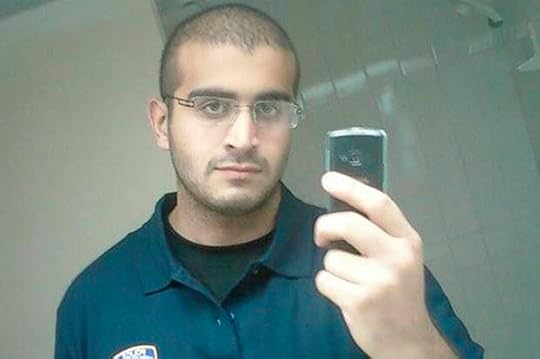
Omar Mateen (Credit: AP/Balkis Press)
A local TV news station in Orlando, Florida, is reporting it took a call from deceased gunman Omar Mateen during his mass shooting Pulse nightclub early Sunday morning.
Producer Matthew Gentili, who fielded calls during the attack that claimed 49 lives, said he was “receiving phone calls from viewers saying, ‘What’s going on? What’s happening … in Orlando?’”
So it wasn’t out of the ordinary to get a call from a man asking, “Do you know about the shooting?”
Gentili was answering affirmatively when the caller interrupted.
“I’m the shooter. It’s me. I am the shooter,” the caller said, adding that he “did it for ISIS” before speaking Arabic.
Asked where he was calling from, the self-alleged shooter said it was none of Gentili’s business.
“It was silent for a while. I asked him: ‘Is there anything else you want to say?'” Gentili said. “He said no and hung up the phone.”
In the aftermath, Gentili was reportedly interviewed by the FBI, who declined to say whether the caller was actually Mateen. But the station said it later traced the call to a number matching Mateen’s.
Read Gentili’s full account here.
June 14, 2016
A gun lover’s case for gun control: Not all of us believe in the right to bear assault weapons

(Credit: Isaac74 via Shutterstock)
I grew up in a family of hunters. My father gave me a .22 rifle and a single-shot .410 shotgun when I was six years old. When my uncles (sometimes an aunt or two) and older cousins got together on a Sunday afternoon, at least one of them had a new gun to show off. The young kids like me were expected to share in the love, and respect, for firearms. I learned about marksmanship, which gun was best for which sort of hunting, that you never use more firepower than is necessary, and most of all, gun safety.
Although I quit hunting years ago (something that most of my relatives found bewildering), I continue to love guns. I like the cool feel of the steel and fruity scent of the oil. I like the hard, metallic clacks of a chamber opening or a clip plunging into place. I like to go to the firing range to squeeze the trigger, receive the recoil, hear the pop, and smell the puff of gunpowder. I like knowing that if an intruder threatens my home, I can protect my family.
I can do all of these things without an assault weapon.
With each tragic mass shooting like the recent one at the Pulse nightclub in Orlando the gun control debate resurrects with renewed vigor. Like most social concerns, the loudest voices tend to be from camps at the opposite poles of the issue’s spectrum. One group says that gun ownership is the shank of the problem and calls for severe restrictions on who can own firearms, how many, and what types—the “Guns kill!” camp. The other end sees any restriction as producing a slippery slope that will lead to overturning the second amendment—the “They’re coming for our guns!” group. The result of such for-me-or-agin-me opposition results in gridlock when legislators consider suggestions for reducing the number of the tragic shooting that keep us all in fear. I believe that the majority of gun owners want reasonable steps, such as banning assault-style weapons, to make our country safer.
The term “assault weapon” is admittedly vague. It usually means a semi-automatic, high capacity gun. An automatic rifle is like a machine gun in that, when you can hold down the trigger, it fires repeatedly and rapidly until you release the trigger. A private citizen cannot lawfully own one of these in some states. A semiautomatic rifle fires as fast as you can pull the trigger. If you can pull it three times per second, it will fire three rounds in that second. High (or large) capacity generally means that the gun can hold more than ten rounds at once. For the AR-15, the most popular of such guns for private citizens and the weapon of choice for mass shooters, the typical clip holds 30 rounds. Others that hold many more rounds are available. This means that shooter can fire 30 or more rounds without reloading, and for an experienced shooter, an empty clip can be replaced with a full one in a couple of seconds.
Of all the gun enthusiasts that I have known, none has ever owned a weapon with such fire power. Their guns are usually for specific purposes—shotguns and rifles for various sorts of hunting, pistols for home protection, some for target practice only, some of exquisite artistry to hang over the fireplace. No gun owner I have ever known has imagined him- or herself in a situation in that called for firing hundreds of rounds within minutes.
The murderers in mass shootings, however, have imagined themselves doing just that. Since the Federal Assault Weapons Ban (enacted in 1994) expired in 2004, use of these weapons and the numbers of casualties in mass shootings have increased. The shooter in Orlando was first reported to have used an AR-15, which has now been clarified as the Sig Sauer MCX rifle (as the Washington Post puts it, “aesthetically similar to and just as lethal as an AR-15″). Shooters in other massacres used similar guns. Think the San Bernardino holiday gathering, think the Aurora, Colorado movie theater, think Umpqua Community College, think Sandy Hook elementary school. Other mass shooters used high-capacity pistols, such as the Virginia Tech shooter’s Glock 19 whose 15-round clip is standard.
I am familiar with the “They’re coming for our guns” group’s reasons for opposing a ban on assault weapons.
Guns don’t kill people; people kill people. Of course this platitude is true, but people can kill far more people in a shorter amount of time with assault weapons. These guns are designed to cause great destruction as they have done too many times.
Banning assault weapons will not keep them out of a determined person’s hands. Again, this may be true, but should we make it easy for them? Besides, automatic weapons, such as machine guns, are heavily restricted and illegal in many states. The mass shooters have not used them but have instead chosen the legally and easily obtained semi-automatic weapons.
A trained gunman can kill just as many people with any other sort of gun. The evidence from mass shootings speaks otherwise. According to research from Everytown for Gun Safety, based on data from the FBI, in mass shootings from January 2009 to July 2015, when high-capacity magazines were used, 155 percent more people were shot and 47 percent more people died.
If we let them ban assault weapons, they’ll take away our Second Amendment rights altogether. This is the worst sort of slippery-slope argument, one that ignores obvious distinctions. (I’ll bracket the discussion of whether the clumsily-worded Second Amendment is about private ownership or a “well regulated militia” only, for the Supreme Court has ruled that the amendment guarantees private ownership rights.) Most people, including gun owners, of course, are capable of making distinctions among different sorts of weapons. This alarm assumes that we can see no difference between an AR-15 and a .38 revolver. Here in Florida, as in other states, I cannot own a ballistic knife (one that ejects a detachable, spring-powered blade). That ban has not affected my carrying a pocket knife or wearing a sheath knife.
A bumper sticker on my truck reads “Gun Toting Liberal.” Several times I’ve had people lower their car windows at traffic lights to comment on the apparent oxymoron. I am an enigma to my liberal friends who do not own guns and are in the “Guns kill!” camp. I befuddle my conservative friends who do not own guns but nevertheless side with the “They’re coming for our guns!” bunch. But for my gun-owning friends across the political spectrum, gun ownership is not a partisan issue. Similarly, we have more agreement than not regarding restrictions on what sorts of firearms should be illegal. I hope that these people and others like them, the ordinary gun owners of America, will speak up and be heard over the extremists who have blocked reasonable discussion of legislation concerning assault weapons.
“20 minutes of action” is 20 minutes for Brock Turner — for his victim, it’s a lifetime
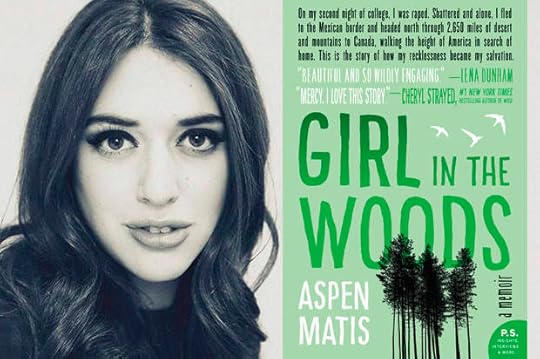
Aspen Matis
Brock Turner, a 20-year-old Stanford University athlete, was found guilty on three felony counts for the sexual assault of an unconscious woman behind a dumpster, penetrating her sexually, inserting pine needles inside of her, violently raping her.
Our collective focus has shifted; his father is concerned that his son is not eating enough steak anymore. He is confused as to why “twenty minutes of action” should be so consequential as to warrant jail time.
Judge Aaron Persky disagrees. After the jury found Mr. Turner guilty, His Honor sentenced Mr. Turner to six months.
I have not made a typographical error; the judge believed that six months was the reasonable punishment for the crime of the rape of a person, which was defined by the state of California as sexual assault. Mr. Turner received a six-month sentence in county jail as opposed to the potential 15 years in prison because the judge believed a longer sentence would have a “severe impact on him.”
I am baffled and disheartened.
I was raped in college, and I have something to explain:
It’s brutally unfair that it takes only 20 minutes, or less, to end a person’s capacity to believe that they are safe in the body inside which they must keep living. It’s horrifying how easy it is to change a person’s life forever.
***
On the second day of my freshman year at Colorado College, before classes began and even before I’d removed the yellow and blue construction paper nametag from my door, I was raped by a fellow freshman. I know from personal experience that reporting a rape is the beginning of a battle.
At that time I hoped my rapist would be punished in such a way that it would have a “severe impact on him.”
Instead, my rapist and I entered “conflict mediation”—as if rape could be mediated like a playground fight between children. All my words were lost in an internal hearing within Colorado College’s closed system, at a long folding plastic table. I had no lawyer, no friends or parents present.
It was—as is so often the case—my word against his. My assailant and I testified separately, never together. In a beige conference room, I was questioned by two polite college-appointed mediators, submitting my memory. The mediator sat next to the cheery mediator-in-training, who was “observing.”
The mediator determined that the events of that night were “inconclusive.” The college found my rapist innocent.
That meant they didn’t believe me.
Which was devastating to me.
But Mr. Turner’s sentence is devastating to us all—because it reveals so much more than a personal injustice. Brock Turner was not found innocent; he was found guilty of 3 felony counts of sexual assault.
The conclusion I draw from the six-month sentence is that crimes of rape and sexual assault are treated differently from other felonies, that rapists of a certain class are treated more leniently than other criminals and rape and sexual assault victims continue to be blamed for the crime. The math shows that the system believes that some people’s lives are more valuable than others’. If you’re rich, if you’re white, if you’re a good athlete, you are permitted to ruin lives. If you’re a rape victim, the fact that you’ve suffered dire physical and emotional impact doesn’t count for much. Perhaps (the system seems to suggest) the rape victim bears some responsibility for the crime. The system protects banks from bank robbers, investors from financial fraud. Rape victims, not so much.
This is an issue of compassion.
***
One in five women will be sexually assaulted during her lifetime. 1 in 4 college women in America will be sexually assaulted during her education. The average collegiate campus rapist rapes 6 times.
Only 3 percent of rapes are prosecuted. Rape is basically an unprosecuted crime in America.
After hearing her rapist’s sentence—she was in the lucky 3 percent!—the anonymous Stanford Case victim read a letter to Mr. Turner in the courtroom:
“…all that I was told was that I had been found behind a dumpster, potentially penetrated by a stranger, and that I should get retested for HIV because results don’t always show up immediately. But for now, I should go home and get back to my normal life. Imagine stepping back into the world with only that information.”
***
One bright morning I learned the administration had moved the boy from his room across campus into my dormitory, the floor above me. When I called Campus Housing and asked to be farther away from him, they moved me into the stained cinderblock motel dorm beyond the edge of campus, in the shadowed lot behind the Conoco gas station. My dim room had a sewage leak. I was exiled.
Devastated, I finally fled campus. With four weeks left of my freshman year, I dropped out.
I never returned to finish college, but my rapist stayed in school. After 8 years, it’s still painful to me how badly my college handled it.
It was my body.
It was my safety.
It was my word, my reputation.
It was rape.
“Twenty minutes of action,” and it has taken me years to think through it. I haven’t been able to forget how terrible people can be.
I am sick of administrators and judges diminishing the consequences of rape.
I ask not only Judge Persky and my college conflict mediator, but all administrators of justice: Do you fundamentally believe that all humans are created equal, of equally valuable souls?
“Twenty minutes of action” is 20 minutes for a rapist; for his unnamed victim, it’s a lifetime. In dismissive diction that inadvertently reveals a cold, hard, and yes evil lack of caring for another person, we glimpse the poison that infects our system. The wish to dismiss the truth and obstruct justice is now commonplace, pervasive; we face an infrastructure of terror in which the fact that one in five women is raped is systematically denied.
Brock Turner’s nothing-sentence is only a piece in a much larger story—the ending of which remains to be written.
We are now part of a budding truth movement, fresh in this country, opening the world’s hearts—brave. We’re leading the frightened, telling the actual stories with honesty and courage—and thus holding colleges and the military—all the old institutions—accountable, illuminating their dark, long-hidden systems. We request justice and will not stand for its obstruction. We are parts of something new but also fundamental, a long-overdue revision of a backward system—fighting for rationality, compassion, and the (basic!) respect of humanity—the human mind and also human body. This is a fight for freedom, in all senses, and our efforts are growing into a revolution. The mission is to override and overthrow selfishness, little-mindedness and the entitlement it allows, and “justice” with any agenda, which amounts to injustice. Which leads to pain, which feeds hatred directly. It is the time to stop this terrible cycle, and we are.
This fight is worth it.
We are only at the beginning, which is a thrilling place to be.
Collectively, we cannot allow trivial things to dominate our focus. Brock Turner’s fading love for ribeye is of subversive interest but not of lasting importance. The stakes are too high to let ourselves become distracted by common repulsive glitter, however hideous. I’m trying to hold my focus on the truth, which is blunt and not very fun to watch:
Pay attention; quietly, as the voices of our TVs debate his appetite for meat, the Honorable judge Persky has reduced Mr. Turner’s sentence to three months. It is baffling, so difficult to fathom why.
And finally we have come to a question worth asking.
Because we must show society’s judges that we can see: Mr. Turner’s actions have consequences greater than the 20 minutes they took to act out. What those consequences are is up to us.
Don’t call Emma Cline’s book “luminous”: The word “seems only used to describe writing by women”

For June, I posed a series of questions — with, as always, a few verbal restrictions — to five authors with new books: Kate Angus (“So Late to the Party”), Ramona Ausubel (“Sons and Daughters of Ease and Plenty”), Emma Cline (“The Girls”), Max Porter (“Grief is the Thing with Feathers”), and Deborah Shapiro (“The Sun in Your Eyes”).
Without summarizing it in any way, what would you say your book is about?
PORTER: Death, childcare, the infinite freshness of fart-jokes, dodgy language, lovely longings, missing people, birds in the home.
AUSUBEL: Wealth as freedom, wealth as burden, road-trips, sea voyages, orphandom, class, race & gender expectations, giants, the desire for home, cream pie.
SHAPIRO: Friendship, family, what happens after you come of age, rock n’ roll, soap operas, creative ambition, time, identity, memory.
CLINE: Sex, passivity and power, California mythology, female friendship, the violence of girlhood, how the past can take the present hostage.
ANGUS: Love, sex, yearning, capitalism, wandering around New York City, drinking wine late at night, friendship, solitude, associative imagery, my dog, what Neko Case called “that teenage feeling,” trying to figure out a good way to be human.
Without explaining why and without naming other authors or books, can you discuss the various influences on your book?
ANGUS: Folklore about fox wives and golems. Coffee. My childhood violin. Falling asleep listening to cassette tapes of Prince, Duran Duran, Cyndi Lauper and the Velvet Underground in elementary school. Search engines. Shipwrecks. Lake Michigan. The East Village. The smell of cardamon.
PORTER: Dead parents, dead poets, stubborn dislike of algorithmic thinking about literary genres. Birds. Babies. I’m not sure about influence, but there are some permission givers without whom I would never have been brave enough to leap naked into a strange middle pond between prose and poetry, between fable and essay.
AUSUBEL: Revolution, 1970s wallpaper design, pregnancy and motherhood, guilt, my grandfather’s sailboat, the idea of California, the money that no longer is.
CLINE: My four younger sisters, the Chosen Family, Olompali State Park, Sonoma County, groupies, psychedelics, Morningstar, cold Pacific beaches, North Bay Craigslist, Dennis Wilson, true crime fetishists, teen magazine vernacular, beauty rituals.
SHAPIRO: Clips of David Bowie on talk shows in the 1970s, the William Eggleston photograph we were lucky enough to use for the book’s cover, images of Gram Parsons, Big Star’s “Third/Sister Lovers,” long summer days in college in the ‘90s, fashion magazines, outer-borough New York, the Catskills, Los Angeles.
Without using complete sentences, can you describe what was going on in your life as you wrote this book?
SHAPIRO: Having a toddler, leaving New York for Chicago, trying to make new friends, loneliness, missing my youth, not missing it, making new friends, homesickness, at home-ness.
CLINE: Shed living. Hot plate quesadillas, miso soup. Flip phone, library books. Silverfish hell.
AUSUBEL: The baby walks, the baby plays basketball, we buy an inflatable pool for the backyard and have cocktails out there; Santa Barbara (sea, hills, persimmons), Santa Fe (parents, mountains, chile), reading/teaching/reading/teaching, pregnant again (barf, swelling, joy), Berkeley (hot tub, star jasmine, good bread), the child learns to tell jokes, ride a scooter, the new baby walks, the new baby plays basketball.
PORTER: Sleep-deprivation, livid fury at the inadequacy of banal narratives of loss and recovery. Revelations. Work. Endless emails and the thrilling discovery of manual–synch to keep the endless emails at bay. Ali Farka Toure. Tallisker single malt. Amber Leaf.
ANGUS: Grad school. Unemployment. Teaching. Starting/running an independent press. Falling in and out of love (twice). The Internet. Tumbling into and then clawing my way out of a pretty bleak depression. Travel. CrossFit. Trying—and failing—to read “Moby Dick.”
What are some words you despise that have been used to describe your writing by readers and/or reviewers?
AUSUBEL: Whimsical.
CLINE: I dislike the word “luminous” which seems only used to describe writing by women.
ANGUS: “Ugh, this is just awful tripe. It reminds me of the Onion article “Two Hipsters Angrily Call Each Other ‘Hipster.’”
SHAPIRO: Years ago someone told me my writing could use more “Olympian distance.” So I tried to get that distance. And then I put that phrase in my novel.
PORTER: I’m yet to despise. But a certain tone-deaf misunderstanding of my intentions regarding affectionate critical literary homage has pissed me off. Like a lot of people I wish to see the tyrannical reign of ‘quirky’ end soon. My Crow will peck the fucking eyes out of quirky.
If you could choose a career besides writing (irrespective of schooling requirements and/or talent) what would it be?
PORTER: I’d like to be a forest balladeer, roaming from wood to wood making music, telling stories, caring for the trees. But I recognize that the dripping sickliness of that cliché should have me banished to the accounts department of Gazprom for eternity.
AUSUBEL: Midwife, owner of a fancy snow-cone shop or panda-bear shampooer.
CLINE: Waldorf teacher, psychotherapist, junk shop owner.
SHAPIRO: Urban planning, maybe?
ANGUS: Sorceress.
What craft elements do you think are your strong suit, and what would you like to be better at?
ANGUS: My use of the second person is on point and I think I’m pretty good at similes. But I have genre envy and wish I had the sustained drive and long-term planning skills of novelists. I’m amazed by other writers who are able to do things like come up with a plot, develop characters, write about things other than the shifting landscape of their own brain.
PORTER: Ah shit, I have no idea. I’m good at nonsense verse. I’m good at sentimentality and I think I’m getting better at checking or interrogating sentimentality when it creeps in. I’d like to try and write a proper book and then answer this question, but I imagine the answer would be that I would like to be better at PLOT.
SHAPIRO: I think I have an ear for dialogue. Plot, if we’re talking about the unfolding of events, is not usually my main concern as a reader, so it doesn’t come all that easily to me as a writer. Though I try! But if we mean plot as tied to character, to the ways that characters are shaped by certain conflicts and desires and how that drives their actions, behavior, and perceptions – that’s something I think I’ve gotten better at over time, as many writers tend to.
AUSUBEL: I’m good at following the weird leads. I am up for disassembling everything in revision (over and over). Plot takes work, language is a joy. I hope to keep getting better at all the parts.
CLINE: I think I’m good with descriptions and a kind of psychological reporting. I’d like to get better at extending the scope beyond a single narrator or consciousness.
How do you contend with the hubris of thinking anyone has or should have any interest in what you have to say about anything?
AUSUBEL: Articulating the human experience requires all the voices.
ANGUS: I assume that they don’t. But I keep writing anyway.
SHAPIRO: I’m generally curious to know what other people think about things, and I’d hope that people would extend that same kind of curiosity to me. Ideally, I see the writer-reader relationship as something generous, a form of communication, and then it isn’t a question of hubris so much as connection. But that doesn’t make the all-too-frequent self-doubt any less paralyzing.
PORTER: She’s called Jess, and we’ve been in love since we were teenagers. The second it invades my mental space I run this notional interest you describe past her and she pops it like the lethal balloon of hot air it is. And then we drink tea and discuss the latest episode of “Suits.”
CLINE: Nah.
Fox News anchor finally gets fed up: “Can’t we hold true the sanctity of the Second Amendment while still having common sense?”

(Credit: Fox)
On the Tuesday edition of her show ,”The Real Story,” longtime Fox News anchor Gretchen Carlson took a startling stand for gun control — in stark contrast to her networks continued coverage of the Orlando shooting massacre.
“Time now for my take,” Carlson said in the middle of her show Tuesday, transitioning from a segment on the political ramifications of the attack on Pulse nightclub in Orlando, Florida.
“Every time we have a mass shooting we talk about guns,” Carlson pointed out. “Yes, the Orlando massacre was terror, but there is no doubt that Omar Mateen was able to kill so many people because he was firing an AR-15. A military-style assault weapon. A weapon easier to buy in the state of Florida than buying a handgun.”
Pointing out that Democrats and President Obama have called for a reinstatement of the federal assault rifles ban that outlawed the semi-automatic gun popular with young mass murderers, Carlson also noted that Republicans have blocked even debate on curbing gun use, asking her Fox News audience what they thought of gun control in the wake of the worst mass shooting in recent U.S. history.
“Do we need AR-15s to hunt and kill deer?” the former “Fox & Friends” host asked. “Do we need them to protect our families?”
“A recent quinnipiac poll shows 58% of you support banning the sale of assault style weapons,” Carlson explained.
“I know a lot of you aren’t going to agree with me today,” Carlson conceded. “That’s fine,” she continued, “But I’m also with the majority today taking a stand.”
“Can’t we hold true the sanctity of the second amendment while still having common sense?” she asked.
Watch below, via Raw Story:
Jerry Seinfeld’s Q&A with Mark Zuckerberg is just plain awkward — see for yourself
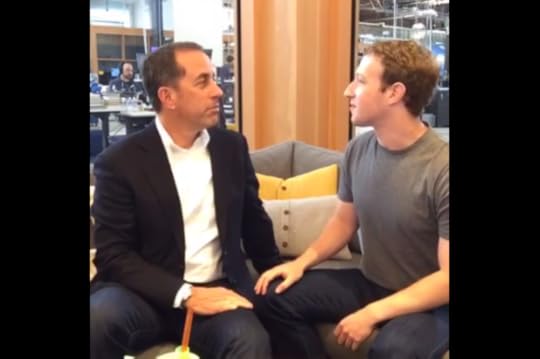
Facebook founder and CEO Mark Zuckerberg’s live Q&A took a gimmicky route Tuesday afternoon with a thoroughly awkward cameo from comedian Jerry Seinfeld, who apparently was on the premises to promote the company’s forthcoming virtual reality feature.
“I had no idea you would be here,” a clearly joking Seinfeld said. Zuckerberg responded that that was his line, to which Seinfeld explained, “That’s why it’s funny when I say it.”
Off to a less-than-great start, but with plenty of room for improvement, the two — eye-to-eye, thigh-to-thigh — pivoted to questions posed by live viewers.
“I don’t find any of these interesting at all,” said Seinfeld, who instead asked Zuckerberg what time he’d woken up Tuesday morning. (The answer was 6AM.)
Asked what’s the first thing he does when he wakes up in the morning, Zuckerberg said he checks his phone.
“I do that too,” Seinfeld said. “I usually want to know, did the Mets win or not?”
“That’s not my thing,” Zuckerberg said.
“I know,” Seinfeld said. “I’m asking what you do.”
Zuckerberg checks Facebook. Surprised?
Watch the whole thing below (Seinfeld joins around the 43:30 mark):
WikiLeaks will release new Clinton emails to add to incriminating evidence, Julian Assange says, in “big year ahead”
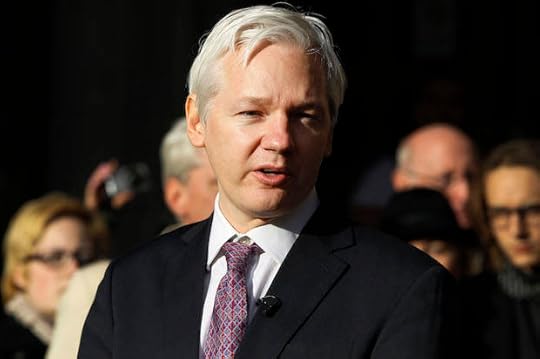
WikiLeaks editor Julian Assange on Dec. 5, 2011 (Credit: AP/Kirsty Wigglesworth)
Julian Assange, editor-in chief of WikiLeaks, says the whistle-blowing journalism organization will soon be publishing unreleased emails from Hillary Clinton.
Clinton, the Democratic Party presidential front-runner, has been under criminal investigation by the FBI for using a personal email account on a private server in her home that contained top-secret information.
Assange doesn’t believe that Clinton will be indicted, but argues that the government has more than enough evidence, in both her emails and in the dealings of the Clinton Foundation, if it were truly committed to doing so.
“We have upcoming leaks in relation to Hillary Clinton,” Assange said. “WikiLeaks has a very big year ahead.”
Assange made these remarks in an interview with the British ITV network on Sunday. The host noted WikiLeaks has been “taking interest” in Clinton’s use of the private email server.
“‘Taking interest’ I think is putting it mildly,” Assange replied. “We’ve published 32,000 of them and some analysis.”
Asked about the FBI investigation, the WikiLeaks head said he thinks Clinton “unfortunately” won’t be indicted.
“We have accumulated a lot of material about Hillary Clinton; we could proceed to an indictment,” Assange said, but Attorney General Loretta Lynch, the top official at the Department of Justice, who was appointed by President Obama, won’t indict Clinton, Assange argued.
“It’s not going to happen,” he said. “But the FBI can push for concessions from a Clinton government.”
Assange stressed that “there’s very strong material, both in the emails and in relation to the Clinton Foundation,” that incriminates Clinton.
A recent report revealed that the FBI is investigating then-Secretary of State Clinton and other State Department officials for “backing” CIA drone assassinations in Pakistan with their cellphones.
In another example, Assange noted in the interview, WikiLeaks published an email in which Clinton tells her staff to remove the classified header on a classified document and to send it by non-classified fax. This clearly violates U.S. classification procedures.
“Of course I think, personally, a lot of these [classification] procedures are ridiculous,” Assange added, “but Hillary Clinton has been pushing to prosecute others, and so has Barack Obama, who violate, technically, these procedures.”
The Obama administration has used these procedures and the Espionage Act to punish whistleblowers who leaked to journalists more than all previous presidential administrations combined.
Assange said he is worried a potential President Clinton would go after him and WikiLeaks.
The emails WikiLeaks has already published show that Clinton receives constant updates on Assange’s situation, he stressed in the interview.
Assange also pointed out that Clinton has previously pushed for prosecution of WikiLeaks for its whistle-blowing.
“We do see her as a bit of a problem for freedom of the press more generally,” he said.
The WikiLeaks editor also blasted Clinton for her extreme hawkishness.
Assange pointed out that Clinton’s emails “show that Hillary was overriding the Pentagon’s reluctance to overthrow [Libyan dictator] Muammar Qaddafi, because they predicted that the post-war outcome would be something like what it is, which is ISIS taking over the country.”
Numerous reports have highlighted the leading role Clinton played in the disastrous 2011 NATO war in Libya, which destabilized the oil-rich North African nation, now home to ISIS’ largest base outside of Syria and Iraq.
Clinton “has a long history of being a liberal war hawk, and we presume that she is going to proceed,” Assange concluded.
In an interview with Salon in February, Assange made similar remarks.
“We can expect many more subsequent disasters if Clinton becomes president,” he said, warning “she is very hawkish” and would be a “disastrous” president.
He also condemned the Obama administration for “its harsh repression of whistle-blowers and national security journalists,” calling Obama “the meanest president” in those regards.
The WikiLeaks editor said insurgent left-wing candidate Bernie Sanders’ policies in regards to Wall Street and corporate domination were refreshing, but, emphasizing that his specialty is in foreign policy, noted Bernie “has a lot of problems” in that area too.
Assange was arrested in London in December 2010, but was never charged with a crime. Fearing politically motivated U.S. extradition, Assange took refuge in Ecuador’s embassy in London in August 2012. He has remained holed up there since.
The British government has spent millions of tax dollars to monitor the Ecuadoran embassy 24 hours a day, seven days a week, in order to ensure that he does not leave.
The U.N. Working Group on Arbitrary Detention declared in February that “Julian Assange has been arbitrarily detained by Sweden and the United Kingdom.”
“Assange has been subjected to different forms of deprivation of liberty” and “is entitled to his freedom of movement and to compensation,” the U.N. said.
Aggrandizing ISIS: Giving overseas militants undue credit plays into their hands and obscures the truth

Militant Islamist fighters on a tank take part in a military parade along the streets of northern Raqqa province June 30, 2014. (Credit: Reuters)
The social media personality and would-be president was quick to inquire via Twitter whether Barack Obama is “going to finally mention the words radical Islamic terrorism? If he doesn’t he should immediately resign in disgrace!” As usual, Donald Trump slips below an already-low Republican bar: this obsession with calling the enemy by its name, of course, is a standard talking point.
“The broader solution is a commander-in-chief willing to speak the truth, willing to name the enemy — radical Islamic terrorism — and willing to do whatever it takes to defeat radical Islamic terrorism,” said Ted Cruz last December.
The right wing wants Obama to say the word Islamic, some talisman against terror, because it wants to foment hatred of Muslims. This week, Hillary Clinton obliged them, saying that she was fine using either “radical jihadist terrorism” or “radical Islamist terrorism,” because they “mean the same thing.” Obama has declined to do so because saying that the U.S. is at war with Islam, combined with the fact that the U.S. is at war in multiple Muslim-majority countries, might further cement the idea that it is.
Most everyone, however, is now comfortable condemning the act as terrorism, an epithet that renders the assailant a known evil and the victims empathetically American. But initially this attack, like others, fell into an unclear category and was still “being investigated as a possible act of terrorism, either domestic or international.”
“We do have suggestions that the individual may have leanings toward that particular ideology,” said FBI Special Agent Ronald Hopper in the early hours, referring to Islamist militancy.
Somehow, dozens of bloodied bodies could not speak for themselves: the question of whether an act is terrorism, and not just an all-American mass shooting, is considered to be a matter of discerning what was in the killer’s mind — and, typically, whether he was Muslim.
This selectivity has not gone unnoticed: after Dylann Roof massacred black churchgoers in Charleston, and after Robert Dear did the same at a Colorado Planned Parenthood clinic, there were demands that the white killers also be designated terrorists. There is no perfect word to describe horrible things like these: we need frames to think about and understand things in our lives, big and small. But terrorism is a particularly bad frame for describing violence because it obliterates our ability to think carefully and critically about why it happens. It also, in this case, helps elevate Omar Mateen, the obscure and troubled man who committed this mass murder, into a world-historical figure.
Mateen reportedly called 911 and pledged allegiance to ISIS during his rampage , and ISIS quickly embraced him as its agent. Former Congressman Barney Frank seemed to do so as well, saying that it was “an attack against gay people” that “does not reflect a general deterioration of our standing in America…It reflects the virulence of the hatred in this sector of Islam.”
As Rukmini Callimachi writes in the New York Times, “Was the killer truly acting under orders from the Islamic State, or just seeking publicity and the group’s approval for a personal act of hate? For the terror planners of the Islamic State, the difference is mostly irrelevant.”
Government and media, however, have become complicit in ISIS’ ambition to project power beyond its operational limits. Identifying Mateen or the San Bernardino shooters as ISIS agents benefits ISIS by legitimating American franchises to which they have no direct connection and christening any disaffected person making use of easy access to high-powered firearms bona fide operatives of the self-described caliphate. Simply put, giving ISIS more credit than it is due unduly aggrandizes them, and in doing so bolsters a framework for disaffected people to violently express themselves.
After the Charlie Hebdo attacks, former FBI counterterrorism agent and Brennan Center for Justice fellow Michael German criticized government policy as counterproductive: “Telling every anti-social misfit and petty criminal that they can achieve notoriety and influence government policy by acting out violently with whatever tools are at hand isn’t an effective counterterrorism strategy.”
The debate over whether to prosecute terrorists inside the criminal justice system or via extra-legal channels generally hinges on civil liberties. But German says that treating these attacks as crimes is also important because it puts them in context and pushes back against their outsized glorification. Currently, government policy is intent on creating more of the very monsters it professes its dedication to destroy.
“15 years into the global war on terrorism, we’ve identified the number one threat: a group that didn’t exist at the time we started the war, and is actually in conflict with the group that we did initiate the war against,” says German by phone. “I think it’s past time for our intelligence and law enforcement officials to have a more objective and less politicized discussion of violence…in the United States and our counterterrorism response.”
As far as we know, ISIS is part of this attack only because it gave a mass murderer a framework within which to make sense of his personal anger and alienation. As Olivier Roy has written, “This is not, then, the radicalization of Islam, but the Islamization of radicalism.”
According to various reports, Mateen was bullied in school, inconsistent in his religiosity. A mentally ill gun enthusiast who aspired to be a police officer, Mateen had previously worked for the Florida Department of Corrections and most recently as a security guard, and brutally abused his ex-wife. It has also been reported that Mateen was a brooding regular at Pulse, and exchanged messages via the gay dating and hook up app Jack’d. Classifying Mateen as a terrorist, or a member of ISIS, means that we don’t have to think about the easy availability of assault rifles, or about the intimate relationship between sexism and homophobia.
For the American right in particular, fixing the mass murder within the framework of Islamic terrorism provides a rhetorical escape hatch, eschewing mention of their uncomfortably shared anti-gay animus and the fact that most victims are the very Latinos who Trump incites hatred against.
Whatever connection Mateen had to overseas Islamism appears to have been limited to his muddled and troubled mind. He had allegedly declared contradictory allegiance to both Shiite Hezbollah and Sunni ISIS. It is increasingly clear that Mateen’s story is an American one.
Erasing U.S.-born Mateen’s American context, and linking him wholesale to some faraway Muslim place, makes it impossible to understand who he was and what might have motivated him. Like much terrorism discussion, it absolves the United States and makes the problem about something and somewhere else.
Mass shooters often chase fame and suicide: “These are not people who want to … live with the crimes they commit”
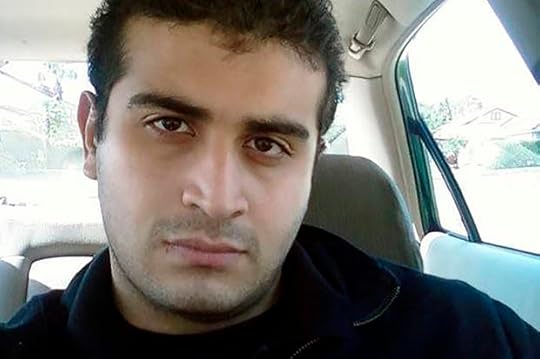
Omar Mateen (Credit: AP)
The shooting at Orlando’s Pulse nightclub, the largest mass shooting in American history, continues to baffle and upset people. Clearly, it was motivated by hatred and made possible by easy access to military weaponry, but what else might have contributed?
Salon spoke to Adam Lankford is a criminal justice professor at the University of Alabama and whose research concentrates on mass shootings, social deviance, criminology, terrorism, and counterterrorism. He’s also the author of the book “The Myth of Martrydom: What Really Drives Suicide Bombers, Rampage Shooters, and Other Self-Destructive Killers.” We spoke to him from outside Washington, D.C; the interview has been lightly edited for clarity.
These shootings have become sadly regular over the last few years. What does this one have in common with others we’ve heard about recently?
It’s similar to other acts of mass shooting which had a perpetrator who espoused Islamic fundamentalist ideology. We’ve seen that before, most recently in San Bernardino and at the Chattanooga military shooter last summer. But if you look beyond the stated ideology, there’s a lot of similarities with the Charleston church shooter, who espoused a racist ideology, or a variety of other offenders, whether they claimed to be ideological or not.
Is there anything that makes the Orlando shooting unique or atypical, besides the obvious fact that each incident is a little different from every other?
Of course it stands out because of the number of victims killed, and because it was a delayed crisis before the police were able to shoot the offender and bring the incident to a close. I’ve been studying a lot of these incidents, both in the United States and around the world, and I cannot remember an incident that lasted more than three hours, like this one, since Columbine.
In the coverage of this case, we see talk about Islamic terrorism, about guns, mental illness… But is there a factor or issue here that we typically overlook when we discuss this kind of case?
Just in the last five years there’re been more of a conversation about fame seeking and attention seeking, and that’s something I’ve studied in depth. Sometimes the fame-seekers explicitly admit that as a motive, and sometimes they don’t.
But in this particular case, this was a guy who clearly had delusions of grandeur – he celebrated after 9/11, he claimed that Osama bin Laden was his uncle… And he was talking about martyrdom, about joining Al Qaeda. The FBI thought he was just doing that to get attention. I guess the sad irony is that they were right – but trying to get attention is one of the classic symptoms of a mass shooting.
His father said that the talk about ISIS and other terrorist organizations was just a boast, that he was really just trying to latch onto something. A lot of these attackers realize the more victims they kill – especially if they do it in a dramatic way, like at a nightclub on a Saturday night and Sunday morning – the more likely you are to get attention.
And as far as the cultural factors, a lot of scholars have done research that suggests that fame seeking is more prevalent in the United States than anywhere else. And the father of the perpetrator appears to have been a fame seeker himself, so he grew up in that context. The father claimed he was a candidate to be president of Afghanistan, and he was hosting a television show, and he had all these Facebook followers.
It’s a confluence of things, but I’d like to see our culture move in a way where celebrity is less of a priority.
I know it’s hard to tell for sure, especially after a shooter has been killed. But can you even estimate how often a mass shooting is motivated by fame-seeking?
That’s a good question, but it’s essentially impossible to know… I have done a study of this in which I’ve found 24 examples of offenders who made explicit statements that acknowledged fame seeking. Of course there are many other cases where they didn’t say something – for example, the case with the Aurora theater shooter, he never said explicitly, “I want to be famous.” But he dressed up like the joker and showed up on the premiere night of one of the Batman movies – clearly a theatrical and staged attack.
Not exactly someone trying to keep a low profile.
That’s right. So there are a lot of things like that. And you add in ideology – people who claim they’re fighting for neo-Nazism, or Islamic fundamentalism, or something like that – they often justified their personal desire for attention as a way to get attention for their cause.
There’s a debate in the media whether we should publicize the names of shooters and killers, especially those who seem to be chasing fame. How do you see it?
I think it makes sense to look at the overall coverage of the offender rather than just the name. It makes sense to release the name in the initial coverage – I’m even okay in releasing the photo. Where it starts to bother me is when two months later every story continues to show the picture, and list the name… It seems like the organizations or blogs are looking for more clicks rather than providing newsworthy or new information.
You mentioned your hope that American society becomes less celebrity-obsessed. What other things might limit this kind of violence? We can’t stop it completely, but are there societal factors that might make it less common?
Certainly, we live in a culture with a tremendous number of suicides – more than 30,000 a year. If we can make general social progress to reduce the number of suicides, get better treatment for people with suicidal thoughts… That’s the main goal, and as a side benefit, I bet you’d see fewer people committing mass shootings that ended in their death.
There’s an interesting element we see with mass shooters who claim to be motivated by Islamic fundamentalism and end up dead – they almost never shoot themselves in the head. And by contrast, other school shooters and rampage shooters often do shoot themselves in the head.
More broadly, there’s a huge discussion in this country about police use of force, and use of deadly force. It’s kind of a complicated thing, with a lot of moving pieces. But I think if there was a way to resolve the situation, so that the offender could survive – could be taken alive – I think that would deter some of these offenders, because they don’t want to live through their attacks. They want to go out in a blaze of glory. And as we saw in the case of the Fort Hood shooter, he was shot in the spine, and was paralyzed but survived. And he’s since tried to sabotage his defense so he can be executed. These are not people who want to face the music, and live with the crimes they commit. If there were more lethal ways to resolve these crimes, I think they might function as deterrents.
Ahead of meeting with Clinton, Sanders calls for “fundamental transformation of Democratic Party”
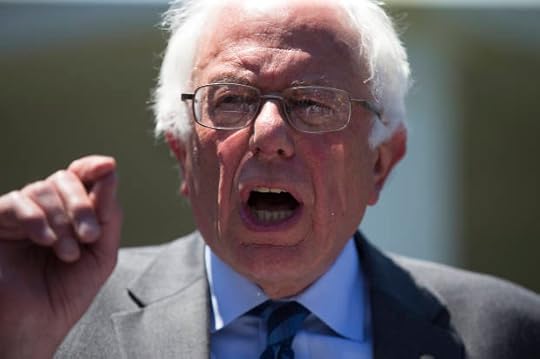
Democratic presidential candidate Sen. Bernie Sanders, I-Vt. speaks to reporters outside the White House in Washington, Thursday, June 9, 2016, following a meeting with President Barack Obama. (AP Photo/Evan Vucci) (Credit: AP)
We have finally neared the end of the road. Tonight marks the end of the long Democratic primary season, and before Bernie Sanders meets with presumptive Democratic nominee Hillary Clinton after polls close in the District of Columbia tonight, the Independent Vermont senator publicly committed to another battle — fundamentally transforming the Democratic Party.
Sanders spent the weekend back at home, huddled with supporters in Vermont and he reportedly plans to address supporters via teleconference on Thursday about how “the political revolution continues.” But on Tuesday, the senator traveled to D.C. where he delivered a speech calling for specific electoral reforms in the Democratic presidential primary process.
“I think the time is now, in fact the time is long overdue, for a fundamental transformation of the Democratic Party,” Sanders said, after opening remarks forcefully condemning attempts to scapegoat all Muslims for Sunday’s mass shooting in an Orlando nightclub.
Speaking in front of the DNC’s headquarters after meeting behind closed doors with Senate Democratic colleagues, Sanders listed “just a few of the changes” he’d like to seem implemented — many familiar complaints from the campaign trail.
Sanders called for new leadership at the DNC (a move that routinely happens with any new administration), open primaries with same-day registration in every state, and the end of the superdelegate system:
WATCH: @BernieSanders: It’s time for a “fundamental transformation” of the Democratic Party https://t.co/LXz3qtHg1A
— ABC News Politics (@ABCPolitics) June 14, 2016
In an interview with Time late last month, Sanders laid out his vision for the Democratic Party in further detail.
“Whether I win or lose,” Sanders said ahead of the California primary, “what I want to see is a transformation of the Democratic Party into a grassroots movement.”
Calling his reforms “obvious no-brainers,” Sanders again blasted the superdelegate system as “undemocratic” and outlined the top progressive policies he wants incorporated into the party platform at the convention next month:
I think the issues of contention will be the understanding that Secretary Clinton has been wrong in supporting virtually every single one of these trade policies. I think what this campaign has shown is that working people understand that NAFTA and CAFTA and PNTR with China have been disastrous for working families. I think there will be some opposition to my point of view but I have the feeling that we’ll win that debate as well.
Secretary Clinton has come up, as usual, with a very complicated and convoluted approach on higher education. You got to spend half your life filling out forms and checking your income every day. I’m not sure that we will not win fairly easily on the issue of making public colleges and public universities part of what we consider to be public education, making it free. I suspect we’ll win that one as well.
I think the real debate will center around how aggressively we take on the fossil fuel industry. I will push for a tax on carbon. Secretary Clinton now opposes that. I think the crisis on clean water is one of the evolving crises in our country around the world. I think you’ve got to ban fracking.
[…]
I think a contentious issue which we have a shot to win is whether or not we break up the large financial institutions and we create a new financial system not based on a handful of giant Wall Street banks. That will be contentious. If I were a betting guy, I’d think we’d win that. But we may not.
I think the polls suggest that among Democrats there is strong support for a Medicare-for-all, single-payer system. And my guess is we’ll probably win that one too. We may not. But I think we’ll win that one as well.
The other issue that will be contentious is tax reform and making sure the wealthy and profitable corporations start paying their fair share of taxes.
“So those are a few of the issues” Sanders said to conclude his lengthy list. “I think we’ll win most of them. I think the Wall Street fight will be a difficult one, it may not be, depending on the wording of tax reform, that will be tough.”



